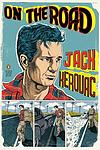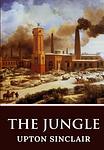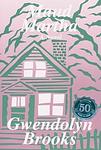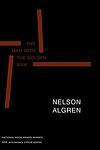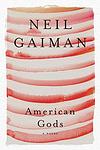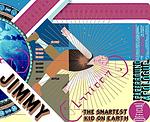The Greatest "Chicago, Fiction" Books of All Time
Click to learn how this list is calculated.
This list represents a comprehensive and trusted collection of the greatest books. Developed through a specialized algorithm, it brings together 300 'best of' book lists to form a definitive guide to the world's most acclaimed books. For those interested in how these books are chosen, additional details can be found on the rankings page.
Genres
The "Chicago" category of books refers to literature that is set in or inspired by the city of Chicago. These books may explore the city's rich history, diverse culture, and unique architecture, or delve into the lives of its residents and the challenges they face. From gritty crime novels to heartwarming coming-of-age stories, the Chicago genre encompasses a wide range of themes and styles, all united by their connection to this iconic American city.
Countries
Date Range
Reading Statistics
Click the button below to see how many of these books you've read!
Download
If you're interested in downloading this list as a CSV file for use in a spreadsheet application, you can easily do so by clicking the button below. Please note that to ensure a manageable file size and faster download, the CSV will include details for only the first 500 books.
Download-
1. On the Road by Jack Kerouac
This novel follows the story of a young man and his friend as they embark on a series of cross-country road trips across America during the late 1940s and early 1950s. The protagonist, driven by a desire for freedom and a quest for identity, encounters a series of eccentric characters and experiences the highs and lows of the Beat Generation. The narrative is a testament to the restlessness of youth and the allure of adventure, underscored by themes of jazz, poetry, and drug use.
-
2. Native Son by Richard Wright
This novel tells the story of Bigger Thomas, a young African-American man living in Chicago's South Side during the 1930s. Bigger's life takes a tragic turn when he accidentally kills a young white woman. The incident leads to his arrest and trial, revealing the deep-seated racial prejudices and injustices prevalent in American society at the time. The narrative explores themes of poverty, systemic racism, fear, and the effects of oppression.
-
3. The Adventures of Augie March by Saul Bellow
"The Adventures of Augie March" is a novel set in Chicago during the Great Depression. The story follows the life of Augie March, a poor but spirited boy growing up in a broken home, as he navigates his way through life. The narrative explores his various jobs, relationships, and adventures, as he constantly seeks his identity and place in the world. His journey is marked by a series of encounters with different people and experiences, each shaping him in unique ways.
-
4. The Jungle by Upton Sinclair
This novel exposes the harsh conditions and exploited lives of immigrants in the United States in Chicago and similar industrialized cities. The protagonist, a young Lithuanian immigrant, works in the meatpacking industry and experiences the extreme poverty, poor working conditions, and lack of social services. The narrative explores the corruption of the American meatpacking industry in the early 20th century and the hardships faced by the working class, leading to significant public outcry that contributed to the passage of the Pure Food and Drug Act.
-
5. Herzog by Saul Bellow
The novel centers around Moses Herzog, a middle-aged, intelligent yet distressed man who is going through a mid-life crisis. After his second marriage fails, he falls into a state of emotional turmoil and begins writing letters to friends, family, and even famous figures, expressing his philosophical thoughts and personal feelings. His journey of self-discovery and understanding forms the crux of the story. It's a profound exploration of a man's struggle with the complexities of life and his quest for meaning.
-
6. U.S.A. Trilogy by John Dos Passos
The U.S.A. Trilogy is a series of three novels that chronicle the lives of various characters in the first half of the 20th century in the United States. The narrative intertwines the stories of twelve characters as they navigate the societal changes and upheavals of the era, including World War I, the Great Depression, and the rise of Hollywood. The author uses a unique narrative technique that combines traditional prose, newspaper-style headlines, biographies, and stream-of-consciousness writing to paint a vivid picture of American life during this period.
-
7. Sister Carrie by Theodore Dreiser
The novel follows a young country girl who moves to the big city where she starts realizing her own American Dream by first becoming a mistress to men she perceives as superior and later as a famous actress. It is a portrayal of the realities of the modern city and the complexities of the modern world, illustrating the influence of consumer culture on the individual. Despite her moral decline, the protagonist's rise to fame seems to defy the conventional social norms and moral values, making the novel a notable instance of naturalist literature.
-
8. Humboldt's Gift by Saul Bellow
This novel explores the friendship between a successful writer and his mentor, a once-celebrated poet now living in poverty and mental instability. As the protagonist navigates his own existential crisis amidst a life of material success, he reflects on the ideals of his mentor and the nature of art and personal ambition. The narrative grapples with themes of materialism, the purpose of art, and the spiritual emptiness of modern life.
-
9. Passing by Nella Larsen
"Passing" is a novel about two light-skinned African-American women, Irene Redfield and Clare Kendry, who can 'pass' as white. Set during the Harlem Renaissance, the story explores the intricacies and challenges of racial identity in 1920s America. Clare, who has chosen to live as a white woman, married to a racist who is unaware of her true heritage, risks everything when she reconnects with her childhood friend Irene, causing both women to grapple with their identities and desires, leading to tragic consequences.
-
10. The House on Mango Street by Sandra Cisneros
The book is a collection of interconnected vignettes that detail the experiences of a Latina girl growing up in the Hispanic quarter of Chicago. It explores her struggles with her identity, her desire for a better life, and her experiences with poverty and gender roles. The protagonist's observations and experiences weave a vivid picture of life in a Latinx community, and her dreams of a better future give the narrative a sense of hope and resilience.
-
11. Maud Martha by Gwendolyn Brooks
The novel is a poignant exploration of the inner life of an African American woman navigating the complexities of identity, beauty, and dignity in 1940s Chicago. Through a series of vignettes, the protagonist reflects on the joys and challenges of her everyday experiences, from the nuances of family dynamics and marriage to the sting of racial prejudice and societal expectations. Her journey is one of self-discovery and resilience, as she seeks to affirm her worth and find contentment amidst the often harsh realities of her world.
-
12. The Man with the Golden Arm by Nelson Algren
"The Man with the Golden Arm" is a novel that tells the story of Frankie Machine, a talented card dealer and drummer in post-World War II Chicago who becomes addicted to morphine. The narrative vividly portrays his descent into addiction and his struggles with poverty and crime, while also exploring themes of despair, corruption, and redemption. The book is notable for its gritty depiction of life in the urban underbelly and its nuanced characterizations.
-
13. Presumed Innocent by Scott Turow
A gripping legal thriller, this novel follows the story of a chief deputy prosecutor who finds himself accused of the brutal murder of his colleague, with whom he had a passionate extramarital affair. As the evidence against him mounts, he struggles to prove his innocence while uncovering corruption and deceit within the very system he once served. The story is a riveting exploration of the complexities of the legal system, human nature, and the concept of presumed innocence.
-
14. A Raisin In The Sun by Lorraine Hansberry
The play explores the dreams and struggles of a Black family living on Chicago's South Side in the 1950s. When the family receives a $10,000 insurance check after the father's death, each member has different ideas about how to use the money. The mother wishes to buy a house to fulfill her late husband's dream of providing a better home for the family, while her son wants to invest in a liquor store to secure their financial future. The daughter seeks to use part of the money for her medical school tuition. Their conflicting aspirations and the pervasive racism of the era put a strain on the family's unity and values, as they strive to find their place in a world that often seems to work against them.
-
15. American Gods by Neil Gaiman
A recently released convict discovers that his wife and best friend died in a car accident. He then meets a mysterious stranger who hires him as a bodyguard. As they journey across America, it is revealed that the stranger is an old god, traveling to rally his fellow forgotten deities to wage a war against the new American gods born from society's modern obsessions with media, technology, drugs, celebrity, and more. The story blends elements of fantasy, mythology, and Americana to explore themes of faith, belief, and the nature of American identity.
-
16. Studs Lonigan by James T. Farrell
"Studs Lonigan" is a trilogy that follows the life of an Irish-American man growing up in the South Side of Chicago. His life is marked by aimlessness and self-destruction, as he navigates through adolescence into adulthood against the backdrop of the Great Depression. The protagonist's struggle with his own ambitions, societal pressures, and personal weaknesses provides a stark examination of the human condition and the American Dream.
-
17. The Time Traveler's Wife by Audrey Niffenegger
The novel tells the story of a man with a genetic disorder that causes him to time travel unpredictably, and his wife, an artist who has to cope with his frequent absences and dangerous experiences. Their love story endures many separations and dangerous experiences due to his condition. The story's central theme is the effects of time travel on their marriage and their passionate love for each other.
-
18. Jimmy Corrigan, the Smartest Kid on Earth by Chris Ware
The book is a graphic novel that tells the story of Jimmy Corrigan, an awkward and lonely man in his mid-thirties. Jimmy has lived his entire life under the thumb of his overbearing mother. When he receives a letter from his estranged father, whom he has never met, he embarks on a journey that takes him from his home in Chicago to a small town in Michigan. Along the way, the narrative delves into the lives of his ancestors, revealing a history of loneliness and disappointment that seems to be repeating itself in Jimmy's own life.
-
19. Quicksand by Nella Larsen
"Quicksand" is a semi-autobiographical novel about a mixed-race woman named Helga Crane who, feeling out of place in both African-American and white societies, embarks on a journey of self-discovery. From the Southern United States to Denmark and back, she struggles with racial identity, sexual repression, and societal expectations, eventually marrying a reverend and becoming disillusioned with her life as a preacher's wife in the rural South. The novel explores themes of racial identity, class, and gender in the early 20th century.
-
20. The Resistible Rise of Arturo Ui by Bertolt Brecht
"The Resistible Rise of Arturo Ui" is a satirical play that uses the rise of a fictional 1930s Chicago mobster, Arturo Ui, to parallel the rise of Adolf Hitler in Nazi Germany. The narrative is a critique of those who allowed Hitler to come to power, emphasizing that his rise was indeed resistible. The play explores themes of power, corruption, manipulation, and the dangers of complacency, showcasing the destructive potential of unchecked ambition and the failure of society to prevent the ascent of dangerous individuals.
-
21. The Help by Kathryn Stockett
Set in the early 1960s in Jackson, Mississippi, the story revolves around three main characters: two black maids and a young white woman. The maids, who have spent their lives taking care of white families and raising their children, agree to share their experiences with the young woman, who is an aspiring writer. The book offers a poignant and humorous look at the complex relationships between these women, while also exploring the racial tensions and social changes of the era.
-
22. Kane and Abel by Jeffrey Archer
"Kane and Abel" is a captivating saga that follows the lives of two men born on the same day on opposite sides of the world. One is born into a life of privilege and the other in extreme poverty. Despite their vastly different beginnings, their lives intertwine in a tale of ambition, rivalry, and revenge. Over the decades, they build successful lives, unaware of each other, until their paths cross, leading to a fierce battle that only one of them can win.
-
23. The Titan by Theodore Dreiser
"The Titan" is a novel that continues the story of a ruthless and ambitious businessman as he expands his empire in the early 20th-century United States. Having conquered the streetcar industry, the protagonist now sets his sights on utilities and finance, using his wealth and power to manipulate stock markets, bribe officials, and crush any opposition. His personal life is equally tumultuous, filled with affairs and scandals that threaten his marriage and social standing. This narrative serves as a critique of the American Dream and the capitalist fervor of the time, exploring themes of greed, corruption, and the quest for power at the expense of ethics and human relationships.
-
24. The Iron Heel by Jack London
"The Iron Heel" is a dystopian novel set in a future world where a tyrannical oligarchy, known as The Iron Heel, has seized control of the government and economy, brutally suppressing the working class. The story is told through the eyes of a socialist revolutionary, who chronicles the ruthless rise of the oligarchy and the subsequent struggle for freedom and equality. The novel explores themes of class conflict, inequality, and the power of resistance, offering a stark critique of capitalism and a prophetic vision of a future dominated by corporate power.
-
25. The Asphalt Jungle by W. R. Burnett
This novel delves into the gritty underworld of urban crime, focusing on a meticulously planned jewelry heist that promises to be the ultimate payday for its diverse crew of small-time crooks and down-on-their-luck characters. However, as the operation unfolds, the group's carefully laid plans begin to unravel due to a mix of greed, betrayal, and the relentless pressure from law enforcement. Set against the backdrop of a bleak, post-war American city, the narrative explores themes of desperation, the elusive American dream, and the thin line between order and chaos in the pursuit of survival and redemption.
Reading Statistics
Click the button below to see how many of these books you've read!
Download
If you're interested in downloading this list as a CSV file for use in a spreadsheet application, you can easily do so by clicking the button below. Please note that to ensure a manageable file size and faster download, the CSV will include details for only the first 500 books.
Download